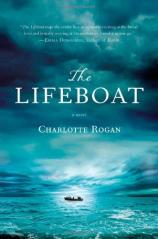The Lifeboat
Review
The Lifeboat
Grace Winter's story opens with a prologue describing an interaction with her lawyers --- the men charged with proving her innocence in a murder trial. Grace is just 22 years old, but has been "…married for ten weeks and a widow for over six." She shocks her lawyers as they leave the courtroom for lunch by holding her face up to the rain to drink of it. Just doing this transports her back to the lifeboat in which she spent three weeks.
"This is a gripping, urgent story told in a manner that doesn't settle easily and will be difficult to forget.... "[R]eaders will find much to discuss...in this memorable tale reminiscent of Titanic meets LORD OF THE FLIES."
Grace had eloped with the wealthy Henry Winter, marrying in London because of the disapproval the couple expected from Henry's family. As they sail home on the Empress Alexandra, there is an explosion on the ocean liner, and it begins to sink.
Although Grace claims she cannot remember quite how she entered the lifeboat, she finds herself in one that is floating by relics from the ship that are now bobbing about in the ocean. There are bodies in the water, and people are clinging to whatever they can find. Nightmare scenes unfold before Grace's eyes. She sees a mother throw her child into the ocean and then leap in after her. A lifeboat flips over when it’s lowered, losing its passengers. Swimmers approach Grace's lifeboat, but oarsmen beat their hands away. They pass by a small boy, but when some on board ask to pick him up, Mr. Hardie, the man in charge, refuses, saying one person will have to leave the boat if another enters it. Almost immediately, Grace notices that the lifeboat she’s in is overloaded. There are 39 passengers, and, although the sign on the boat says the capacity is 40, they ride very low in the water.
Grace hopes Henry is sitting in a lifeboat waiting for rescue, too. Meanwhile, as the only Empress Alexandra crew member aboard, Hardie becomes the lifeboat passengers' leader. He organizes the group, assigning seats according to weight distribution. He also makes rules about movements within the boat and instructs the passengers in jobs, such as rowing. At first, Hardie inspires confidence in Grace, who seems to see some godlike attributes in the rough-spoken seaman. He feeds the group, passing out hardtack and tiny bits of cheese, along with measured sips of water. The passengers are in shock but are optimistic; after all, Hardie claims they will be rescued soon. On their second day bobbing in the ocean, two of the passengers joke about how nice it would be if one or two people volunteered to leave the boat. However, it isn't too long before the question of "volunteers" is not at all humorous.
As the days turn into weeks, the passengers' characters begin to peel away, like onion layers, revealing who they truly are. In Grace's words, "The bare bones of our natures were showing. None of us were worth a spit. We were stripped of all decency." Gossip circulates through the boat, and one persuasive passenger faces off with Hardie in a deadly battle for supremacy. These survivors within the lifeboat are desperate to continue surviving, but they believe they all cannot live. Some must die.
This is a gripping, urgent story told in a manner that doesn't settle easily and will be difficult to forget. Grace is a complex narrator, and not exactly a sympathetic one. Should we believe her interpretation of events? At any rate, readers will find much to discuss --- moral quandaries, Grace's character, how well we would fare in similar circumstances --- in this memorable tale reminiscent of Titanic meets LORD OF THE FLIES.
Reviewed by Terry Miller Shannon on May 11, 2012
The Lifeboat
- Publication Date: April 3, 2012
- Genres: Fiction, Historical Fiction
- Hardcover: 288 pages
- Publisher: Reagan Arthur Books
- ISBN-10: 0316185906
- ISBN-13: 9780316185905










